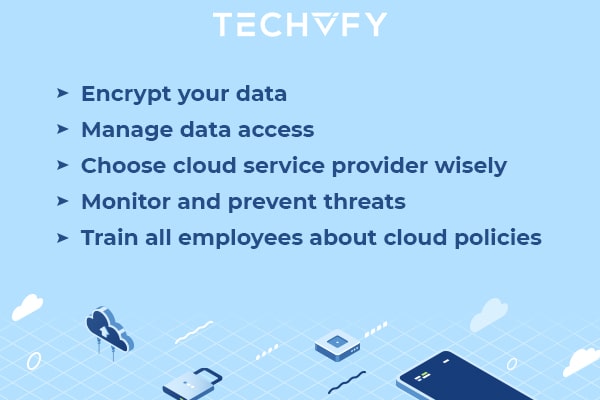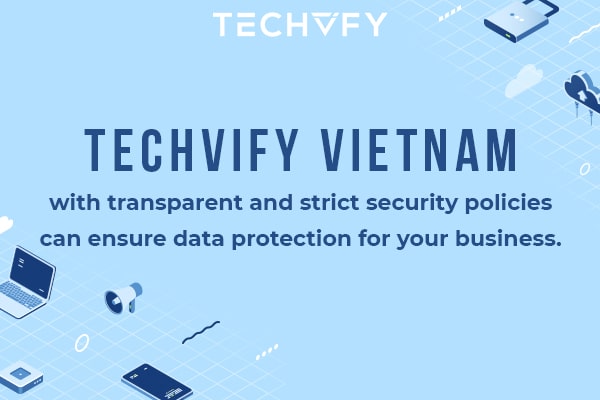Top 5 Cloud Service Best Practices to Protect Your Data


Cloud service plays an undeniably important role in managing businesses. It enables business owners to store information on the internet, develop virtualized IT infrastructure, and deliver software through the cloud. Therefore, to fully utilize the power of cloud service, there are some cloud service practices that businesses should follow. Let TECHVIFY introduce the top 5 cloud service best practices to ensure your data security.

Top 5 cloud service best practices to ensure your data security.
Encryption is considered one of the most effective cloud service best practices to ensure data security. By applying encryption and practicing secure encryption key management, businesses can be sure that only authorized users have access to sensitive data. In short, even if that data falls into the wrong hands, it is useless as long as its keys remain secure.
This is especially beneficial when it comes to cloud service. Data encryption protects a company’s contents in the event that a provider, account, or system is compromised.
Cloud encryption is also important for industries that need to meet regulatory compliance requirements. It allows companies to defend against data breaches and cyberattacks. Encryption, when combined with other security measures, enables enterprises to meet the stringent compliance requirements of HIPAA (for healthcare organizations and business associates), PCI DSS (for e-commerce and retail organizations), and SOX (for financial reporting).
Make sure that that data is properly protected. An ideal cloud environment should support data encryption for data moving both to and from the cloud. Check with your cloud service provider to see what encryption policies they offer. Each provider should have detailed guidelines that show how they protect the data stored on their cloud servers.
Learn more:
By enacting access control policies, you can manage the users that attempt to enter your cloud environment. This cloud service best practice also allows you to assign specific rights and access policies to different users. In other words, low-level cloud users won’t have the same access rights as high-level security administrators.
Access management generally requires three capabilities: the ability to identify and authenticate users, the ability to assign users access rights, and the ability to create and enforce access control policies for resources:
An untrustworthy cloud service provider can cause many data security troubles for your business. While most cloud service providers try their best to enforce cloud security measures to attract more customers, some claim to have the best protection as a marketing strategy.
Finding a reliable vendor is one of the most important cloud service best practices, which plays a decisive role in your data protection plan.
To choose the most secure cloud providers, companies can use various factors to rate the effectiveness of their security policies. For example, you can assess their levels of compliance with various information compliance standards. To ensure cloud service providers are fully compliant, a business should require them to produce compliance certifications that show that providers meet all compliance audit requirements. Furthermore, cloud providers should maintain multiple backups and demonstrate they can ensure 24/7 data and network availability.
TECHVIFY Vietnam has credits from customers for being a trustworthy cloud service provider. With our transparent and detailed security policies, you can rest assured that your company’s data is saved in our hands.
In cloud service management, the consumers and cloud service providers share the responsibilities of monitoring and responding to suspicious cloud security. Cloud service providers monitor the security of infrastructures they use to provide the services, while the customer monitors the applications and systems various users use for access. Responding to any security event requires both providers and consumers to share their responsibilities.
Cloud service providers monitor IT infrastructure that provides services and computation resources, including entire SaaS applications, networks, and IaaS. The service providers may detect activities that could harm a consumer’s cloud data or applications. Consequently, the provider may need to inform customers about that activities so they can respond promptly.
Traditional security solutions focus on defending against threats as they attack your systems. However, it is recommended to stop a threat on your infrastructure before it has the chance to attack. Threats can hide in your cloud environment and wait for the perfect time to strike. By monitoring your cloud environment, you can discover hidden malware and proactively take steps to remove it.
Without being fully aware of the company’s security policies, employees can cause some harmful threats to the business. Although corporate has implemented a comprehensive data security protocol, employees tend to utilize the cloud without adhering to the strategies. Therefore, monitoring their usage activities is among cloud service best practices that businesses should consider.
In short, your enterprise should take some time to train any employees that will be using the cloud environment on data security practices you’ve adopted.
This way, you can prevent internal security threats while also preparing yourself for external ones.

A cloud service provider with good credibility
In conclusion, to maximize the benefits of cloud service, make sure that you follow these cloud service best practices. Furthermore, if you are looking for a cloud service provider with good credibility, TECHVIFY Software can offer outstanding services for your business.


Table of Contents#1: Encrypt your data#2: Manage data access#3. Choose cloud service providers wisely#4. Monitor and prevent threats#5. Train all employees about cloud policies Technological advancements are paving new paths for companies across different sectors, and the logistics industry is no exception. According to a survey by Gartner, 87% of supply chain professionals plan to invest in enhancing the resilience of their platforms. Logistics encompasses a broad and complex array of processes that demand the utmost precision and continuous optimization. Companies can automate and streamline these processes through software product development, significantly boosting efficiency. In this article, we will delve into the realm of…
26 July, 2024

Table of Contents#1: Encrypt your data#2: Manage data access#3. Choose cloud service providers wisely#4. Monitor and prevent threats#5. Train all employees about cloud policies The technology sector is advancing at an unprecedented pace, and the HR landscape is evolving right alongside it. To attract top talent, HR professionals and organizations need to stay ahead of emerging technology hiring trends. This year, we are witnessing significant shifts in hiring practices that will redefine our understanding of the future workforce. According to a Microsoft study, the number of technology jobs worldwide is expected to skyrocket from 41 million in 2020 to an incredible 190 million by…
25 July, 2024

Table of Contents#1: Encrypt your data#2: Manage data access#3. Choose cloud service providers wisely#4. Monitor and prevent threats#5. Train all employees about cloud policies Customized software plays a major role in managing various tasks within the telecom industry. It is essential for allocating numbers to subscribers and managing networks through optimized and AI-enabled routing protocols. Additionally, it aids in detecting fraud with intelligent telecom software development solutions and maintaining detailed subscriber profiles, including comprehensive call recording reports. I. A Quick Look into the Telecommunication Industry The telecommunications industry enables the global exchange of information in the 21st century. Key players in this sector include…
24 July, 2024


Thank you for your interest in TECHVIFY Software.
Speed-up your projects with high skilled software engineers and developers.
By clicking the Submit button, I confirm that I have read and agree to our Privacy Policy